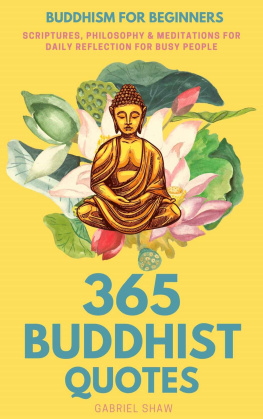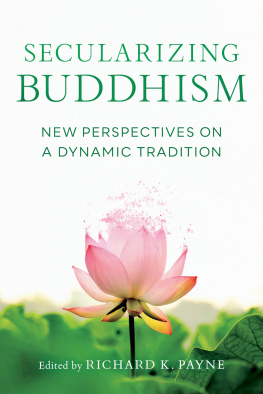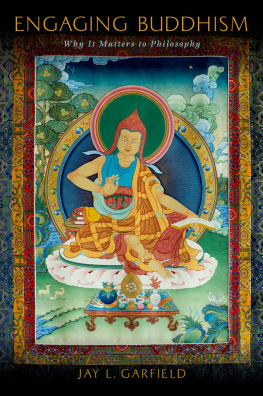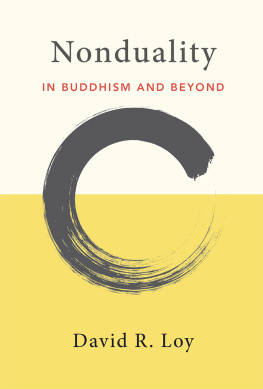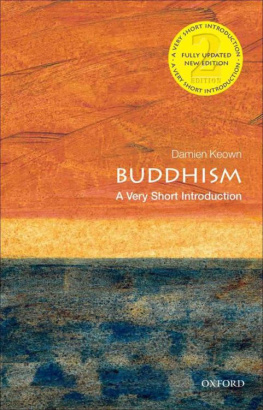THE AUTHORITY OF EXPERIENCE
Curzon Studies in Asian Philosophy
Series Editors
Brian Carr and Indira Mahalingam
The Curzon Studies in Asian Philosophy address various themes in a manner that does not presuppose the specialist linguistic knowledge which has tended to make these traditions closed to the wider philosophical audience. Among the projected volumes, some reflect recent conferences and others are papers specially written for the series. Some have grown out of recent controversies in the Carfax journal Asian Philosophy.
Pali Buddhism
Edited by Frank Hoffman and Deegalle Mahinda
Friendship East and West
Philosophical Perspectives
Edited by Oliver Leaman
Morals and Society in Asian Philosophy
Edited by Brian Carr
First Published in 1997
by Curzon Press
This edition published 2012 by Routledge
2 Park Square, Milton Park, Abingdon, Oxon OX14 4RN
Simultaneously published in the USA and Canada by Routledge
711 Third Avenue, New York, NY 10017
Routledge is an imprint of the Taylor & Francis Group, an informa business
All rights reserved. No part of this book may be reprinted or reproduced or utilised in any form or by any electronic, mechanical, or other means, now known or hereafter invented, including photocopying and recording, or in any information storage or retrieval system, without permission in writing from the publishers.
British Library Cataloguing in Publication Data
A catalogue record of this book is available from the British Library
Library of Congress Cataloguing in Publication Data
A catalog record for this book has been requested
ISBN 0700704507 (cloth)
ISBN 0700704558 (paper)
Authority means both the power to convince and the power to compel. The latter sense takes us towards Hobbes concerns with law, sanctions and obedience. However it is the former sense that is of interest here. This takes us towards a concern with discourse where words like author, authoritative and authentic reflect their Sanskrit origin, meaning what is produced by your own actions is yours. Here we find the more humane sense of authority; as when someone says I saw it with my own eyes. It is the conviction which arises when something is known through direct experience. It is this that confers authority in the sense of the right to be believed and the informed power to persuade.
This collection of essays addresses two apparently contrasting sources of authority: Western psychology and Buddhism. To compare scientific inquiry with, for example, meditation contrasts what is objective and public with what is subjective and private. Nonetheless, method and experience are central in giving each system the authority to say something about the mind. Science and Buddhism are both founded on what can be made to appear in human experience by the application of a method. The contrast lies in how these experiences are created and in the assumptions that are built in to the methods of each system.
Experience itself is culturally conditioned. During the past five hundred years or so in the West, human experience has been fundamentally reformed by science. From the rediscovery of Greek philosophy, through the scientific revolution to the contemporary explosion of cybernetic technology, our sense of ourselves, our world and our place in it have all been transformed. Science is now a highly authoritative source of knowledge in contemporary culture. It provides most people with their creation myth, with an image of themselves and their relation to the rest of the universe. It has thus acquired some of the cultural roles of religion, whether scientists wish it or not.
But discovery did not begin with science. Human beings make an effort after meaning as naturally as they act and breathe. This effort produces growth and order at levels ranging from the evolution of cultural forms to the development of more natural skills like walking and talking. What makes scientific inquiry unnatural is its system.1 Indeed, scientists might just as well be called systematists whose goal is, or was until recently, absolute certainty; another unnatural condition. Science harnesses the human effort after meaning to drive an epistemological system. Its success is patent in the power human beings now have to order things as they wish. This, as much as the depth of its insights into nature, is what gives science its authority. So powerful was the ideal of systematic understanding, prediction and control that it gradually emerged as a political and even spiritual goal. The Enlightenment project was to improve the human condition by progressively disclosing the secrets of nature and using them to conduct society on firm rational principles. This project has transformed world culture from its medieaval to its modern condition during a period of heroic achievement and change.
But the project has failed. There is a growing sense that this modernist image of progress is flawed. Progress has been achieved, but is now being overhauled by a coarsening and commodification of the human condition, by growing inequality and by the loss of biological, cultural and experiential diversity; the condition of alienated experience that Weber called disenchantment. The rational clarity and confidence of the modern period has collapsed into postmodern confusion and uncertainty. The heart of the postmodern predicament is constant choosing, both stylistic and ontological. Realism has not failed, but it has become merely one of many options. In The Birth and Death of Meaning, Ernest Becker disclosed the essentially fictional nature of all human world views; the postmodern predicament is learning how to live with the consequences of this disclosure.2
For Weber, a major contribution to this condition of disenchantment was the misuse of science. Although this is actually a political and economic matter, it is sometimes attributed to the nature of science itself. Over the past few decades, a number of critiques have blamed sciences mechanistic world view and reductive methods for devaluing life and experience. But, in fact, there is nothing in the nature of science itself that devalues anything. It is the search for consistent ways of ordering and understanding phenomena. This search may be based on inappropriate methods or an inadequate image of nature, but so long as science is practiced as a genuinely open system, shortcomings can be recognised and overcome.
However, this seldom happens without turmoil or resistance. Just such a period of contested revision is presently occuring now the limits of reductive mechanism are clearly recognised. An organic view of nature is returning. The notion of a unified theory of all levels of phenomena is treated as a symbolic rather than practical objective of scientific inquiry. While particular levels of phenomena may be more or less completely explained by a particular theory, other levels will not. The order found in nature at higher and lower scales is clearly interconnected but not in ways that necessarily permit prediction. Consistency is sought horizontally and locally, as it were, rather than vertically, implying a genuine plurality in theories and an eclecticism in methods.



